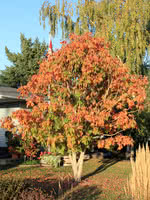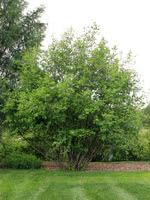Mon-Fri 9am - 5pm Mountain time
Ohio Buckeye vs Green Alder
Aesculus glabra
Alnus alnobetula subsp. crispa
SOLD OUT
Ohio Buckeye is a medium sized deciduous tree. If you are looking for a shade tree, Ohio Buckeye's dense canopy of unique leaves can provide it.
Named after its fruit, an inedible nut enclosed in a prickly husk, Ohio Buckeye also features green-yellow flowers and long, broad leaves that turn brilliant red in the fall.
Slow growing, but an extremely attractive tree. Find out what experienced horticulturalists already know: this tree is a gem.
Green Alder is a native, cold-hardy shrub found in boreal forests, along slopes, and in open upland habitats. It fixes nitrogen in the soil, improving fertility and helping other plants grow, while its roots help stabilize slopes and disturbed ground. Fast to establish on poor soils, it is widely used in reclamation, restoration, and erosion control projects.
With its smooth grey bark and shiny green leaves, Green Alder often forms dense thickets that provide cover for birds and small mammals. Its seeds, buds, and catkins also supply food for wildlife. Green Alder is well suited for naturalization and ecological restoration.
Note: We use Green Alder for Alnus alnobetula subsp. crispa. This species is also known by many other common names, including Mountain Alder, Sitka Alder, and others. Please confirm the scientific name to ensure you are ordering the correct plant.
Ohio Buckeye Quick Facts
Green Alder Quick Facts
Toxicity: nuts are toxic to humans and cattle
In row spacing: 0.9 m (3 ft)

